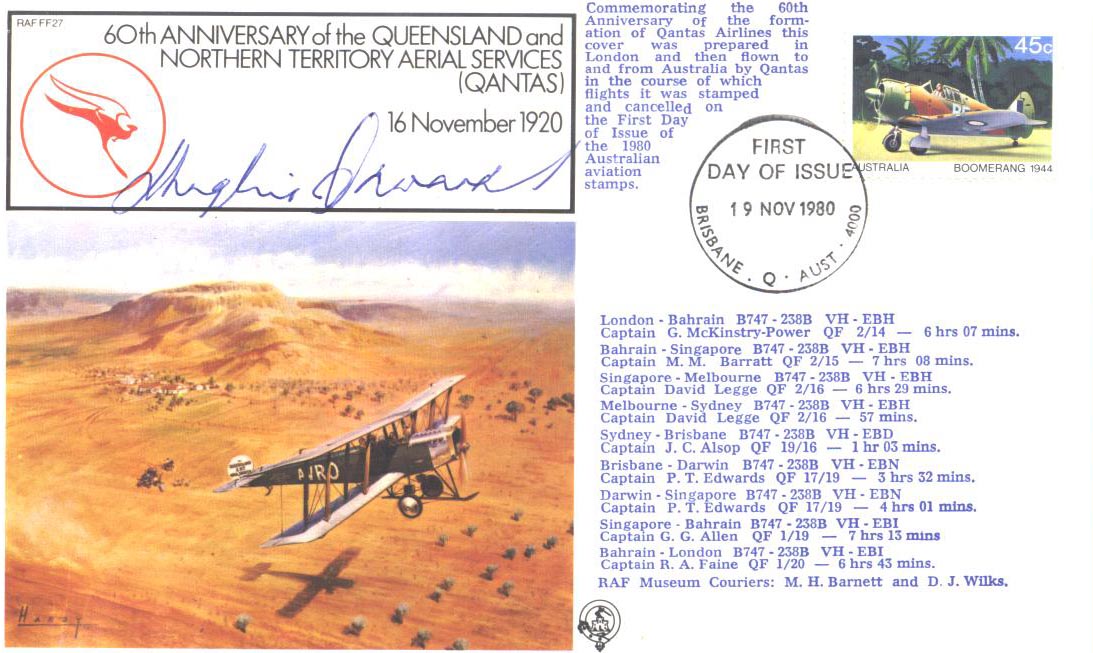
|
EDWARDS Hughie
EDWARDS Hughie
Air Vice Marshal Sir Hughie Idwal Edwards, VC, KCMG, CB, DSO, OBE, DFC (1914–1982)
Hughie Edwards VC
39005 Acting Wing Commander
Hughie Idwal EDWARDS DFC
No. 105 Squadron, Royal Air Force.
4th July 1941, in raid on Bremen, Germany
Wing Commander Edwards, although handicapped by a physical disability resulting from a flying accident, repeatedly displayed gallantry of the highest order in pressing home bombing attacks from very low heights against strongly defended objectives. On 4th July, 1941, he led an important attack on the port of Bremen, one of the most heavily defended towns in Germany His attack had to be made in daylight and there were no clouds to afford concealment. During the approach to the German coast several enemy ships were sighted and Wing Commander Edwards knew that his aircraft would be reported and that the defences would be in a state of readiness. Undaunted by this misfortune he brought his formation 50 miles overland to the target, flying at a height of little more than 50 feet, passing under high-tension cables, carrying away telegraph wires, and finally passing through a formidable balloon barrage. On reaching Bremen he was met with a hail of fire, all aircraft were hit and four destroyed. Nevertheless he led a most successful attack, and then with the greatest skill and coolness withdrew the surviving aircraft without further loss.
"Throughout the execution of this operation, which he had planned personally with full knowledge of the risks entailed, Wing Commander Edwards displayed the highest possible standard of gallantry and determination."
[London Gazette: 22nd July 1941]
Hughie EDWARDS was born at Fremantle, Western Australia, on 1 August 1914. He died in Sydney on 5 August 1982 and was buried in the Northern Suburbs Cemetery, Sydney, New South Wales.
Sir Hugh Edwards V.C. & The Bremen Raid
At seven thousand feet the ailerons froze, and after uncontrollably losing two thousand feet the pilot ordered the crew to bail out. Wrestling desperately to regain control of the disabled Blenheim, he finally conceded defeat at seven hundred feet and left the crippled machine. His parachute fouled the radio mast, and he was dragged down with the machine as it ploughed into the hills along the Scottish border.
Hughie Edwards was a graduate of Point Cook who was strongly censured for his low flying exploits during training, including "bouncing" and narrowly avoiding a train. After transferring to the RAF, he nearly met his end over Scotland in 1938, but amazingly was only "severely damaged" and after two years was ( in April 1940 ) returned to flying duties, although permanently paralysed below the right knee.
Edwards was promoted to the command of 105sqn. (Blenheim IVs) in May 1940, and within a month of his appointment he won the first of his four DFCs, with a soon to become characteristic low level attack., in this instance on shipping.
Then on July 4, his 36th operational sortie, he was detailed to lead fifteen Blenheims ( nine from 105, and six from 107 squadrons) on a raid of the industrial complex of Bremen. Due to tactical considerations this had to be a daylight raid, and the planning was left to him. The weather was clear, the only cloud being very thin stratus at 6000 feet. He decided on a low level approach as a unit from the sea, then to fan out into line abreast and individually choose targets of opportunity. Once the raid was completed the crews were to return by whatever route and method they preferred.
During the approach to the German coastline they flew at an altitude of fifty feet but were sighted by Axis warships who reported their presence to the defences. Realising that they had lost the initiative, Edwards took his crews down to "nought Feet" and hedge hopped the last fifty miles to Bremen to regain some measure of surprise. Approaching the outer defences they encountered a balloon barrage, and after threading their way through that they were immediately attacked by the forewarned anti-aircraft gunners.
As the pilots spread out into the arranged attack formation, the defences started taking their toll, knocking down four machines in quick succession. Edwards, after climbing slightly to clear the masts of moored craft and then dropping down again to get under some high tension lines roared in across the dock area and released his bomb load. Then staying as low as possible, crossed the suburbs and proceeded to circle the city to watch the rest of the raid. In total, he spent ten minutes over the target, his Blenheim being repeatedly raked by ground fire leaving the fuselage riddled with holes, and his gunner wounded after a shell exploded in the rear cockpit. Only when the rest of the group had delivered their loads and flown clear did he complete his reconnaissance and leave.
Again flying at very low level he made for Wilhemshaven, and detoured north of the Fresian Islands before returning to England. When the eleven surviving Blenheims returned, ( Edwards being the last in, just before midday) the condition of the machines and in particular the amount of German telegraph wire that was brought back caused much wry amusement.
The London Gazette announced, on July 22nd, the award of a Victoria Cross to Wing Commander H.I. Edwards for displaying "...the highest possible standards of gallantry and determination."
Within twelve months 105 sqn. had re-equipped with Mosquitoes, and became specialists at low level daylight attacks. Edwards, who had been posted elsewhere the previous September, returned to again be their CO.
Hughie Edwards survived the war to become Governor of Western Australia in 1974.
Signed First Day Cover post mark dated July 15 70 commemorating the Victoria Cross
Price: $60.00
Please contact us before ordering to confirm availability and shipping costs.
Buy now with your credit card
other ways to buy
|


